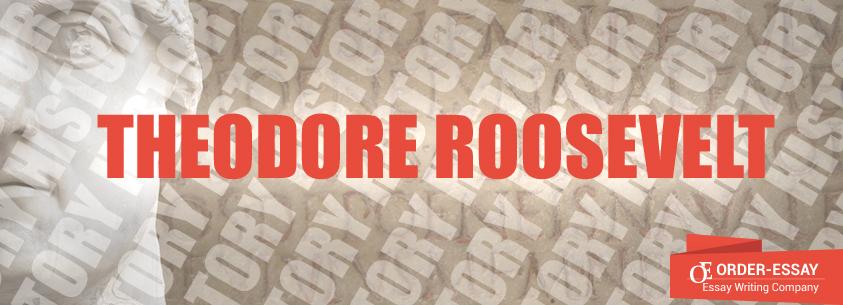
Many people know Theodore Roosevelt as the 26th American president, but it is not his main achievement in life. In virtually every way Roosevelt was almost a superhuman. Analyzing the life of a charismatic leader, Julie Oseid stated that he had multiple and varied careers, namely he was a historian, a rancher, an ornithologist, a military leader, a civil servant, the Governor of New York, the President of the United States, and a writer (2).
Despite the fact that his family was rather rich, little Teddy’s health was truly weak. He constantly fought against various diseases. Apparently, this fact predetermined his stubborn, strong-willed character and passion for the active lifestyle. He always said that nothing in the world is easy, all is achieved by perseverance, pain and suffering.
Throughout the entire life, Theodore Roosevelt had been working as the governor of New York, vice-president, a deputy sheriff in the Dakota, the police commissioner of New York City, Assistant Secretary of the United States Navy, and even as a colonel in the Rough Riders team; afterwards, he became the youngest president in the U.S. history.
As for Roosevelt’s personality, the researchers agree that several features are leading. He was a magnetic person since he charmed both women and men. Moreover, he had a photographic memory not just for words but also for names and faces (Oseid 9).
Being the President, Roosevelt had become a member of the American Academy of Arts and Letters. Afterwards, he became the founder of the National Collegiate Athletic Association (NCAA). Roosevelt was also a good historian and served as the president of the American Historical Association. What is more, he participated in expeditions to Africa and South America in order to gather material for the greatest American museums because he conducted researches of large mammals. Certainly, if Roosevelt had not become the president of the U.S., he would become famous in any of these areas.
In his spare time, he liked to work on his ranch, hunt, and educate six children. It should be noted that Roosevelt read countless books and wrote about 35 works.
After becoming the President of the United States after the assassination of McKinley, Roosevelt implemented an active policy in the country and abroad. The energetic leader was very efficient because the United States quickly evolved and turned into a major world power. Conducting his aggressive foreign and domestic policies and strengthening the rule of President Roosevelt and the federal government has accelerated this process.
The President was confident that people should benefit from everything that the state does. The first thing he wanted to improve was the economy. For example, Roosevelt decided that many trusts do not serve the needs of people. Thus, in 1902, in accordance with the Sherman Act, he sued Morgan Trust and won.
Sometimes, he introduced new laws in order to achieve his own goals such as the law about the quality of products. During the Spanish-American War, Roosevelt experienced unscrupulous approach of manufacturers to meat canning because the soldiers could not eat it, no matter how hungry they were. His law established the quality control of products.
In 1902, the Pennsylvania miners went on strike. They demanded to shorten working hours and increase wages. Being a wise ruler, Roosevelt made concessions.
The protection of nature and architecture was also the sphere of his engagement. Over the entire period of presidency, he put 150 forests, 5 parks and 18 state monuments under the state protection.
Roosevelt’s foreign policy was aggressive. Contrary to the long tradition, this president was not an isolationist. During his presidency, the U.S. became a full-fledged world power and European countries were forced to respect it. Roosevelt revived the Monroe Doctrine and added a new feature to it. According to the doctrine, not only Europe could not interfere in the affairs of the Western Hemisphere, but if some country in the region began to “misbehave”, the United States could take steps to maintain the right order in it. Another important achievement of Roosevelt is the construction of the Panama Canal. David Hanson emphasizes that no action during his presidency aroused as much controversy (1). Despite the obstacles, he was able to organize everything in accordance with his plans because he was not the man who departs from the intended goals. For the mediation in Russian-Japanese War, Roosevelt received the Nobel Peace Prize. Julie Oseid relates that “…Roosevelt’s life story is difficult to summarize, not only because he had so many different careers, but also because he had so much energy, enthusiasm, and stamina that his sixty years are the equivalent of three times that many years in virtually every other human life” (7). After retiring from politics, Roosevelt has not ceased to be active. In January 1914, he went to Brazil to explore the river. The conditions were tough and Roosevelt fell ill with dysentery and malaria; however, he overcame these difficulties because of the strong will. Afterwards, the First World War began.
Roosevelt supported the preparation and entry into the war, and he even wanted to participate in it, but he was refused because of the age. According to his sense of duty, Roosevelt sent all his four sons to fight, and one of them died.
Roosevelt constantly denounced the backwardness of American labor laws compared to other modern industrial nations. First of all, he supported eight-hour day as well as labor protection laws for women and children. However, individual states had legislative powers to address the issues of labor law, and, therefore, the federal government’s initiatives were severely limited. Even the law of employers’ liability was rejected by the Supreme Court in Washington as the unconstitutional one. The desire of Roosevelt to tighten immigration laws in order to keep the United States away from immigrants from Asia as well as Southern and Eastern Europe, corresponded to the interests of American workers.
Important initiatives have been developed in order to protect nature and the environment. In 1902, according to the law of reclamation, the ambitious plan for irrigation of arid regions west was initiated. The protection from the merciless felling of forests was also in his plans. Moreover, he ordered the creation of new national parks and the existing ones were expanded.
Roosevelt was not a racist in the strict sense of modern racial theory, which essentially declared people with different skin color as biologically inferior ones. He was the first president who invited a representative of African Americans to the White House, though he was very criticized for this episode.
Not the color of the skin, but the personal features of people were decisive for him. Roosevelt spoke with great respect about the Japanese, whose socio-cultural achievements he appreciated.
However, his thinking patterns unilaterally directed to his own culture, did not allow him to understand pathetically the problems of other ethnic groups and peoples. He proclaimed that “justice among the nations of mankind, and the uplifting of humanity, can be brought about only by those strong and daring men who with wisdom love peace, but who love righteousness more than peace” (Roosevelt 2). Roosevelt’s deep belief in the superiority of Anglo-Saxon and Germanic civilization identified his foreign policy beliefs, and especially his policy towards Latin American neighbors. Economic motives played in his “imperialist” policies rather subordinate role.



Roosevelt did not take care of the territorial gains, although the area which was provided for the construction of the Panama Canal was an important exception. Stephen Wertheim confesses that Theodore Roosevelt is well-known as an imperialist, while the common understanding is both too weak and too strong (501). However, his “imperialism” was motivated by political security and concentrated in connection with the Panama Canal on the provision of U.S. military superiority in the Caribbean.
Roosevelt brought to the White House a dynamic and decisive leadership style, which he used to promote his views. John Cooper relates that Theodore Roosevelt was a fervent and proud nationalist. Nevertheless he stated that he did not usurp power, he greatly expanded the scope of executive power. Convinced that sea power is the basis of America’s position in the world, Roosevelt strongly strengthened the fleet. He supported a Panamanian revolution against Colombia, which resulted in the formation of an independent state Panama, and the United States was able to acquire the Canal Zone for $ 40 million.
Get a Price Quote
Undoubtedly, his activity is controversial and can be roughly criticized, but one thing is clear; during the presidency of Theodore Roosevelt the United States became one of the world’s great powers.
In conclusion, it should be said that for many of his contemporaries Theodore Roosevelt personified “America” as a country whose political system, socio-economic development and cultural values were regarded as the embodiment of all the modern.
Roosevelt’s name even today is closely connected with the ascent to the modern U.S. power in the world, though the decisive basis for this breakthrough was created prior to his presidency. Roosevelt was a unique governor because he clearly understood and tried to fully exploit new opportunities of the state as a global power. He consistently used the constitutional presidency possibilities and adapted the American political system according to the conditions of the XX century through numerous reforms. Indeed, his leadership style was modern in the sense that he deliberately used the new mass media to enhance personal popularity and political power.








